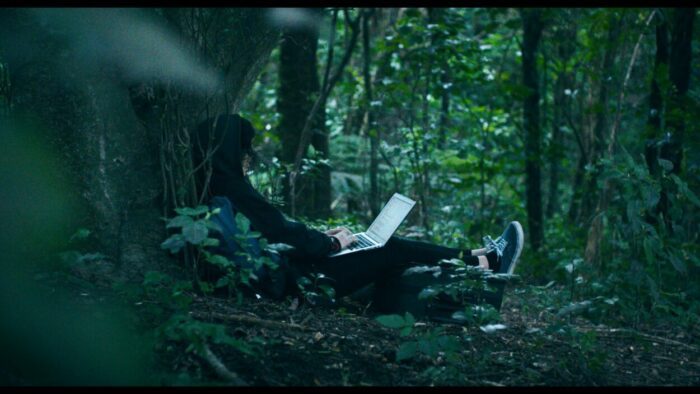Millie (Ana Scotney), an unassuming architecture student from Wellington, New Zealand, has it all: as Millie Lies Low begins, she’s landed a highly coveted, competitive internship with a prestigious New York firm, one that she’s long prized. At the airport, about to embark for the U.S., she is literally the “poster girl” for New Zealand education: it’s her face that beams down from oversize billboards at prospective students as an emblem of their potential success. “You too, can be like her,” the advertisements seem to suggest: their Millie appears perfectly calm, professionally poised, her hair styled straight in an office-ready coif, not a strand out of place, and she looks, with her tapered suit and confident gaze, ready to take on the world.
Except she isn’t.
With her whole future riding on the opportunity and her friends and family all excited for her big break, Millie suffers a panic attack. Just as her plane is ready to depart, she misses her flight. It’s a costly mistake: she hasn’t the money to purchase another fare, and so she silently returns home, suitcase in hand. What will she tell her friends, her family, her followers? Desperate, she pivots: it’s not at all difficult, it turns out, to fake an Instagram post from the flight, and so she begins her ruse. She’ll just pretend she’s where she’s expected to be.

While Millie skulks around Wellington in a hoodie and glasses, suitcase in hand, hoping to avoid everyone she knows, she posts to her social feeds a series of faux missives from New York. Her brick-walled flat is just an alleyway; her wintry snow-angel is a dump of white sand. These scenes are mildly comic, calling into question the power of social media to alter our perceptions of reality: “Pics or it didn’t happen,” goes the saying, but the pics on Millie’s page don’t prove a thing other than her desperate need to pretend she’s having the time of her young life in New York City.
Millie Lies Low, the directorial debut of Michelle Savill and nominated for Generation 14plus Best Film Crystal Bear at the 2022 Berlin International Film Festival, is billed as a “cringe comedy,” but that description seems to me only halfway accurate. There are indeed moments of cringe as Millie’s self-inflicted imbroglios spiral into an increasingly uncomfortable descent. But comic they are not, at least not to my thinking: to laugh at a young woman so obviously in need of attention to her mental health seems nothing but cruel.

Savill, co-writer Eli Kent, and Scotney take a low-key, nearly mumblecore approach to the proceedings, focusing on MIllie’s predicaments rather than pratfalls. There’s never a doubt that her ruse will be exposed: it’s just a question of to what degree her dignity will be debased. (Answer: pretty fully. You’ll feel for the poor girl.) As Millie, Scotney plays most scenes with a quiet intelligence masking her emotions, ready to knock out a fake smile for a social snap at a second’s notice. To label a film like this, then, as a cringe comedy, likening it to more obvious fare like, say, I Love My Dad or A Little White Lie, to name two recent tepid examples of the subgenre, seems to miss an essential element of the film’s focus on its protagonist’s tenuous mental health in an era where the carefully curated, feverishly filtered images of social media take precedence over girls like Millie’s lived realities.
It’s no coincidence, though, that both those films, like so many others, are about imposters: fakes, catfishers, grifters, con men, doppelgangers, passers of one ilk or the next, the cinema is full of frauds. (It is, after all, as Godard famously said, the “most beautiful fraud in the world.”) Some Like It Hot, Tootsie, Mrs. Doubtfire, Catch Me if You Can, Victor/Victoria, Gattaca, The Talented Mr. Ripley (and its French predecessor, Purple Noon), Parasite, The Manchurian Candidate, Black Swan, Imitation of Life, even Face/Off, all operate on the principle of its protagonist “faking it” for one reason or another—often awfully good reasons, sometimes deliberately evil ones—with the risks of being caught driving the narrative. It’s a great conceit that lends itself equally well to comedy and drama both.
In the case of Millie Lies Low, the ruse feels, after its first act, more about the drama of the protagonist’s dilemma than the comedy of her predicaments. Millie is a young girl about to take an important step toward adulthood, poised on the precipice between college and career, when things go awry, and it’s her misguided need to persuade others—especially on social media—that makes her “an imposter.” There would be no great harm in heading home to friends and family, acknowledging the episode for what it is, a mental health incident, and taking proactive steps to recover from it. As it is, the narrative, in placing its protagonist in one increasingly sordid scenario after the next, seems to acknowledge that Millie’s is a mental health issue but can’t quite, except for its pleasant conclusion, address that fact directly.
Millie Lies Low, then is a film that exhibits more potential than anything. Savill’s script is based on an experience she herself had, or almost had, when she missed an international flight to screen a short film at a festival and found it would take over $3,000 to rebook. Savill didn’t take the route her fictional counterpart did, but the experience—and the loss of face that for a time was all-consuming—gave her plenty of pause to think. Eventually, she turned that experience into her own art, and while Millie Lies Low isn’t quite an entirely fulfilling cinematic experience, it’s one that heralds much more to come in the future from a director-writer who, with just her first film, already knows how to face down her fears.
Millie Lies Low opens in New York June 30, followed by theatrical and festival appearances throughout July. 100 minutes.




